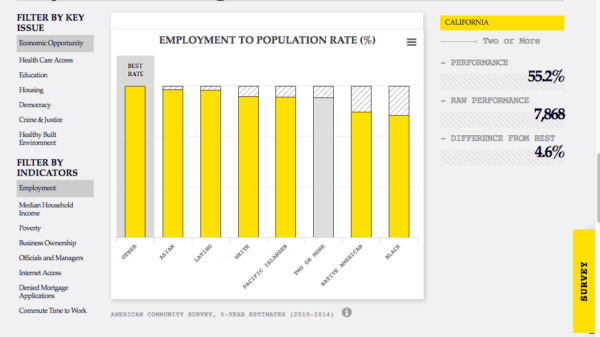Think Race Isn’t a Problem in California? New Report Shows Otherwise
Deepa Bharath, Orange County Register, December 1, 2017
Don’t be fooled by California’s increasing diversity. Racial and ethnic inequity remains a key problem and a potential barrier to future growth, according to Race Counts, a new Web tool that measures racial and ethnic disparities in the state’s 58 counties.
Marin County, for example — one of the wealthiest and most socially progressive communities in America — ranks dead last when it comes to racial inequities in several key factors, according to the data.
Likewise, the four county Southern California region — Los Angeles, Orange, Riverside and San Bernardino — are struggling with racial inequity in areas as basic as income, education, healthcare and incarceration, the data shows.
Unveiled Nov. 14 by Advancement Project California, a Los Angeles-based civil rights group that worked on the project with USC’s Program for Environmental and Regional Equity and the immigration rights group PICO National Network and California Calls, the study examines seven specific measures — economic opportunity, healthcare access, education, housing, democracy, crime and justice, and environment. The group then tracked publicly accessible data to show how Caucasians, Latinos, Asians and African Americans fare in each category.
The end result offered two measures of performance — how all residents in a county are faring, collectively, on the seven categories, and, secondly, how each racial or ethnic group fares when compared with the best performing group in the same county.
{snip}
“In California, racial disparity seems to be accepted as the normal cost of doing business,” he [John Kim, executive director of the Advancement Project,] added.
And as a “majority minority” state, that should not be acceptable any more, Kim said. “If we don’t solve these disparities, California is going to decline.”
{snip}
“There are places in California, like Kern and San Bernardino counties, where white communities are struggling,” he said. “So, the data also shows… we need to create new coalitions where we all work together toward progress and prosperity for all.”
{snip}
For example, in Los Angeles County, African Americans are 13 times more likely to be incarcerated than are whites. Also, on a per capita basis, blacks in the county died at the hands of police four times more often than did whites in 2015, while Latinos died at the hands of police at nearly twice the rate of whites.
The study also showed significant disparities in housing in Los Angeles County, with Latinos three times more likely than whites to lack access to quality housing.
{snip}
Overall, Orange County has the lowest racial disparity among all counties in Southern California, but some stark differences remain. For example, the data shows the rate of truancy arrests is three times higher for Latinos and twice as high for African Americans than it is for Caucasian and Asian students.
{snip}
Latinos are also much more likely to live in poverty in Orange County compared with Caucasian, Asian or African American residents. Also, when it comes to representation in city and county government, Latinos are most likely to be underrepresented.
San Bernardino is the lowest performing county in Southern California overall, based on the data studied, with struggles for all races in almost every category.
{snip}
“California pats itself on the back for being progressive with measures such as raising the minimum wage. But it’s the fourth most unequal state in the nation when it comes to income inequality,” [said Manuel Pastor, director of USC’s Program for Environmental and Regional Equity].
A progressive mentality hasn’t necessarily been matched by economic development and certainly hasn’t translated to policy changes, Pastor said.
{snip}
“There is no question that black and Latino residents feel more of an impact because they are unable to pay for bail and end up giving up their right to a fair trial,” Montes-Rodriguez [Aurea Montes-Rodriguez, executive vice president of Community Coalition] said.
Latinos and African-Americans also tend to get into the prison system for traffic violations simply because they don’t have the money to pay fines.
“We’ve always known that race matters,” she said.
{snip}
[Editor’s Note: The website Race Counts can be found here. Below is just one of the charts they have posted.]
















